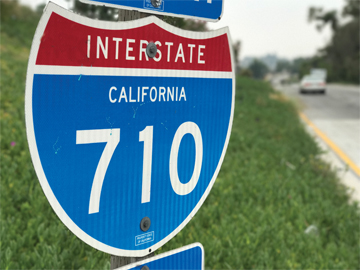
Lack of funding was one reason that the 710 Freeway tunnel project was dropped.
By Nestor CASTIGLIONE
As reported in the May 25 issue of the CV Weekly, the battle over the 710 Freeway corridor, one of the region’s most enduring and controversial infrastructure projects, seems to finally be reaching its end.
Last Thursday the board of directors of the Metropolitan Transportation Agency (Metro) voted unanimously against pursuing the tunnel option. Though the motion also stated that the tunnel was the best of the several alternatives under consideration by Metro, it cited the lack of options for funding the project as the reason to drop it.
A current budget deficit in Sacramento, as well as reluctance from the Trump Administration to provide federal support for large-scale infrastructure projects such as the 710 tunnel, left no immediate realistic options to continue the project.
Opponents of the project were quick to express their support of Metro’s decision.
The No 710 Action Committee issued a press release hailing the decision as a demonstration of Metro’s resolve to “move beyond the era of addressing congestion by adding more [freeway] lane miles.”
Of the approximately $730 million that had been appropriated from Measure R to fund the tunnel, $105 million will be used to improve traffic signal coordination and other low-impact projects. The remaining funds will be disbursed to the cities along the 710 corridor to be used for transportation projects of their choosing. These projects would be collaborative efforts with Metro.
Glendale City Councilmember and Metro boardmember Ara J. Najarian said that the “beauty of this option is that we leave it to the cities to decide how to address this matter.”
Among options he outlined that were within the realm of possibility were streetcars that connected cities like Alhambra, South Pasadena and Pasadena. Previously, a light-rail option had also been dismissed as an alternative to the freeway extension. Another option that was suggested more recently was redirecting the 710 extension through a wide swath of Highland Park and part of Pasadena adjacent to Eagle Rock. That alternative triggered widespread opposition in those communities, where numerous “No 710” signs sprouted along Avenue 64, the street over which the proposed extension would have run.
Najarian, who has often voiced his strong opposition to the tunnel, said that the decision would have an important impact on the local environment.
“This is a huge win for residents who were opposed to seeing an additional 20,000 or more trucks entering through the corridor and polluting our air,” he said.
District 43 Assemblymember Laura Friedman stated she “strongly encouraged Metro to consider innovative options” to address traffic problems.
“A multimodal approach will give residents and the surrounding communities sustainable transportation options that fit the diverse needs of the community,” it continued.
“The efforts of three generations of freeway fighters played a tremendous part in making [last Thursday’s] vote happen,” read a statement from State Senator Anthony Portantino. “As the issue now moves to [Caltrans] for binding action, rest assured that I will be the honest broker and strong advocate for the ‘no tunnel’ position, which moved significantly closer to reality [last week].”
South Pasadena came out as one of the biggest victors of Metro’s decision. The city had long been in the center of the tunnel dispute and its projected trajectory. City Councilmember Marina Khucherian expressed “relief to know that the 710 tunnel is now highly unlikely.”
A final decision on the future of the matter is still pending from Caltrans. The agency is currently submitting the proposed project through an environmental impact review that would be ready by 2018. An ultimate decision on the path forward for the tunnel would be announced then.
No statement in reaction by Alhambra and Monterey Park, two of the tunnel’s strongest supporters, were obtained. An official in Alhambra declined to comment. Diana Wong, secretary to the city manager of Monterey Park, said “there were no new developments to comment publicly on the issue at the present time.”
Metro’s decision was “effectively the final nail in the coffin” for the 710 tunnel, according to Najarian.
“We’re carving the tombstone for this project as we speak,” he said.
Metro’s decision was “effectively the final nail in the coffin” for the 710 tunnel, according to Najarian.
“We’re carving the tombstone for this project as we speak,” he said.
